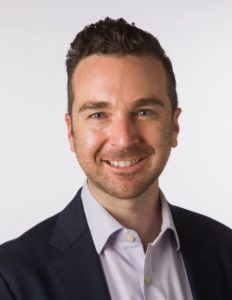HSC researcher envisions new Public Health 4.0 to include racial and gender justice as necessary components for advancing health equity
January 20, 2022 • Uncategorized

A new article published in the American Journal of Public Health (AJPH), co-authored by HSC Assistant Professor Nolan Kline, PhD, describes how one community-based organization in Florida challenged structural racism and COVID-19 together by imagining the future of public health with a new approach to political engagement, research and a collaborative partnership between academics and community.
This article (“Organizing for Black Lives and Funding COVID 19 Relief: Community Responses to Systemic Racism and Imagining Public Health 4.0”), is the result of Dr. Kline’s ongoing research project with the Contigo Fund, an organization that emerged after the 2015 Orlando Pulse nightclub attack, one of the worst mass shootings in U.S. history. Marco Antonio Quiroga, co-author on this publication, is Contigo’s Founding Executive Director and Program Director. Contigo was established to advance social justice and health equity for LGBTQ+ people of color.
“Structural racism is a root cause of poor health in the U.S. and underlies COVID-19 related disparities for Black and Latinx populations,” Dr. Kline said. “These populations are nearly twice as likely to die of COVID-19. The risks are also great for LGBTQ+ members within those groups, who may experience heightened health disparities and pandemic-related vulnerability based on intersecting social marginalization.”
Dr. Kline has been working with Contigo Fund since 2018, employing his skills as a researcher to help the organization apply for grants. Their collaborative work has resulted in two key programs: a fundraising effort focused on improving long-term racial justice through investment in Black LGBTQ+ led organizations, and a COVID-19 relief fund to provide immediate support for individuals needing economic assistance during the pandemic.
Between April 2, 2020, and March 31, 2021, the organization’s relief fund raised nearly $80,000 through philanthropic fundraising and private-foundation grants.
Applicants were able to apply for small grants of up to $500 to meet basic economic needs. Applications were available to individuals regardless of citizenship or immigration status if they lived or worked in the Orlando area’s four counties, identified as LGBTQ+ and had lost income due to COVID-19.
For the longer-term All Black Lives investment fund, a total of $100,000 was secured through fundraising and grant-writing efforts.
Eligibility for these funds required that organizations serve Black LGBTQ+ individuals and be committed to advancing racial and gender justice. The fund was led by four LGBTQ+-focused organizations that received input from leaders of more than 40 organizations of a related local coalition.
“The motivation for this work,” Dr. Kline said, “was to invest in the lives of these populations and begin reversing structural racism, and to create a pipeline supporting LGBTQ+ Black leaders and their visions for new social justice programs designed to combat the social, economic and political disenfranchisement of Black Central Floridians.”
The article concludes that Contigo’s efforts exemplify how public health as a field can respond to structural racism and indicate future directions for research and practice.
“Addressing COVID-19–related health inequality requires responding to structural racism and gender injustice,” Dr. Kline said.
“Public health has moved through phases – including Public Health 1.0 emphasizing prevention, Public Health 2.0 emphasizing core functions of governmental and public health agencies, and Public Health 3.0 examining social determinants of health and prioritizing cross-sector collaborations. In this article, we argue there is now a need for what we call ‘Public Health 4.0,’ in which researchers, public health practitioners and community-based leaders work collaboratively to address the social inequalities that inform poor health. This new vision includes racial justice as a necessary component to advancing health equity.”
Dr. Kline is an Assistant Professor of Health Behavior and Health Systems in the HSC College of Public Health.


Social media